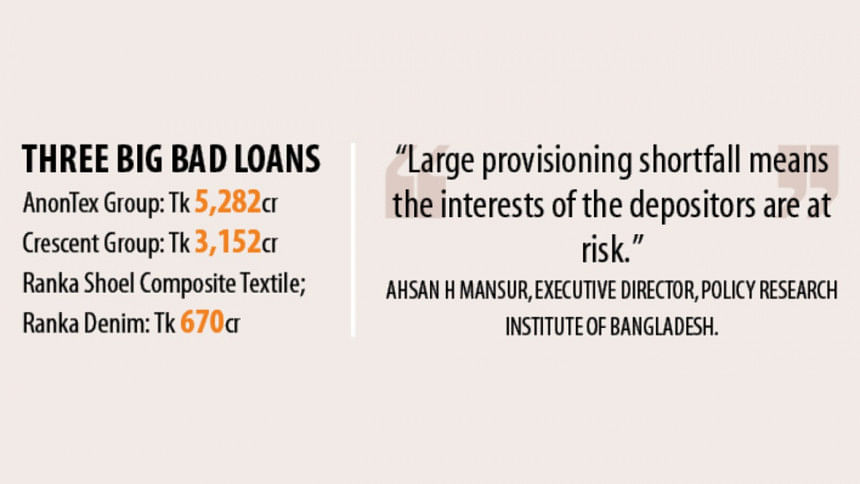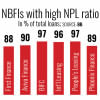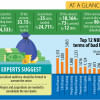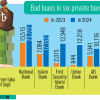Bad loans put Janata in trouble

State-run Janata Bank’s provisioning shortfall has hit a whopping Tk 8,256 crore, the highest-ever deficit for any bank in the country, putting depositors’ money at risk.
And this happened because of a few big errant clients, including AnonTex and Crescent Group, who took hundreds of crores of taka as loans from the bank, but did not pay back, said bank sources.
After BASIC Bank, Janata is going to be the second case of how a relatively good bank turns bad due to poor lending practices, they mentioned.
The state-owned BASIC Bank, which according to the then finance minister AMA Muhith was looted, had faced a provisioning shortfall of Tk 4,063 crore in December 2016. It was the highest provisioning shortfall at that time, and the bank is yet to recover.
Banks are run mostly by people’s money, and when a loan is disbursed, a bank has to set aside a certain amount, as prescribed by the central bank, from its profits to compensate a probable loss. This is called provisioning, which safeguards the depositors’ money.
As per Bangladesh Bank regulations, a bank has to keep 0.50 percent to 5 percent of the total loan amount as provisioning for regular loans, 20 percent for substandard loans (three monthly instalment failure), 50 percent for doubtful loans (nine monthly instalment failure) and 100 percent for bad loans (irrecoverable).
According to BB data, Janata last time faced provisioning shortfall of Tk 82 crore in March 2012. Since then, it was doing well and never failed to maintain the required provisioning till March this year.
Sources in Janata Bank said a surge in nonperforming loans (NPLs) is the main reason behind the sudden rise in its provisioning shortfall.
As of March this year, NPLs at Janata stood at Tk 21,410 crore, which was 44 percent of its total outstanding loans. The amount was Tk 5,818 crore at the end of 2017, show data.
In a letter to the BB on June 19 this year, Janata said if it has to maintain the required provisioning against its NPLs, its net profit and capital adequacy ratio (CAR) will become negative.
“The bank will face an image crisis at home and abroad, posing a potential threat to its smooth operation,” the letter read.
The CAR, a measurement of the ratio of capital to the risk weighted assets, is an indicator of whether a bank has enough capital to absorb a particular level of risk.
On July 14, the central bank responded positively to Janata’s plea for allowing it to maintain the required provisioning in phases.
The BB relaxed the regulatory provisioning for Janata for four years till 2022. But Janata’s profit trends indicate it won’t be able to achieve that, say bank sources.
For example, Janata’s operating profit was Tk 978 crore in 2018, and it will have Tk 586 crore to keep aside for provisioning after deduction of 40 percent corporate tax.
If Janata continues to make profits at the same scale and doesn’t have to deal with any fresh defaulted loans, it will take more than 14 years to fulfil the provisioning requirement, the sources pointed out.
Contacted, Md Abdus Salam Azad, managing director of Janata Bank, said the bank would face net losses if it has to maintain the required provisioning.
“Almost all state-owned banks have taken the deferral support from the central bank to maintain provisioning in phases. This has been happening for the last five to six years and we are not an exception,” he said.
Experts say the unusually high provisioning shortfall will affect Janata’s operation and profitability.
Ahsan H Mansur, executive director at the Policy Research Institute of Bangladesh, said hardly any bank in the world can run with such a large amount of shortfall and defaulted loans.
“Large provisioning shortfall means the interests of the depositors are at risk.
“Maintaining the required provisioning is vital, because in case of an emergency, banks pay back its depositors from provisioning,” Mansur pointed out.
HOW JANATA GOT INTO TROUBLE
Between 2010 and 2015, Janata disbursed more than Tk 5,500 crore to little-known AnonTex Group, involved in textile business, in violation of the banking rules. Now almost the entire loan -- Tk 5,282 crore -- has become bad.
Crescent Group, another entity involved mostly in leather and footwear industry, has defaulted loans of Tk 3,152 crore with Janata.
Janata also gave loans to Ranka Shoel Composite Textile and Ranka Denim generously. The two companies now have Tk 670 crore in defaulted loans.
The borrowers siphoned money from the bank through fake exports and various other tricks.
Under a large loan restructuring policy in 2015, some 11 corporate groups restructured loans of Tk 14,400 crore. Of the amount, Tk 5,000 crore was restructured by Janata. Now 90 percent of these loans have become bad, putting the lender in further strain.
The bank made a net profit of Tk 268 crore in 2017. But last year, its net profit came down to Tk 24.89 crore, mainly because of the sudden rise in defaulted loans.
AB Mirza Azizul Islam, a former finance adviser to a caretaker government, said that if the large provisioning shortfall persists, the lender will face problems in settling export-import related transactions with foreign banks in the days ahead.
“A total failure of corporate governance has created this unpleasant situation for Janata,” he added.
Mansur opposed the idea of giving Janata further support.
“It is time to liquidate the bank [Janata] for the sake of the country’s banking sector,” he remarked.
If the bank is given more time, the situation will worsen further, noted Mansur, also former economist of the International Monetary Fund.
“If the government delays it [liquidation], the volume of bailout funds will increase manifold as the lender’s health is deteriorating fast in the absence of good corporate governance,” he added.

 For all latest news, follow The Daily Star's Google News channel.
For all latest news, follow The Daily Star's Google News channel. 








Comments